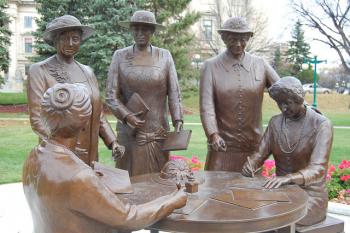Chip in to keep stories like these coming.
Women have a lot at stake in this election: higher rates of economic inequality, impacts of violence and lack of child care. Here's how Winnipeg women fare, and what the major federal parties have said they will do.
A recent study The Best and Worst Cities to be a Woman in Canada found that Winnipeg ranks low as a good place for women to live -- the 18th out of 25 major Canadian cities. One of the key factors for this ranking is the income inequality faced by women. The wage gap in Winnipeg is higher than average: women working full time full year earn 76 per cent of what men earn.
Winnipeg's women's poverty levels exceed the national average by four per cent and women are more likely than men to live in poverty. These rates are worse for Aboriginal and newcomer women, and women with disabilities.
The wage gap persists despite the fact that women in Winnipeg are more likely than men to have completed a post-secondary education. There is a significant gap however in skills and trades training: men are almost twice as likely to have completed trade training and apprenticeships.
Both the Liberals and NDP have said they will spend on infrastructure and boost apprenticeships. Investments like these should be made through a gender lens and targeted at eliminating the gendered wage gap. The Conservatives are offering a small tax credit increase incentive for businesses apprenticeships, but nothing substantial to bridge the wage gap.
Women spend nearly twice as many hours as men looking after the household and taking care of children and family members. Stagnant wages mean households depend on women's paid work, but this requires finding and affording child care. There are 12,000 children on the wait list for child care in Manitoba. The province will struggle to meet this demand without federal assistance.
The federal NDP have promised 1 million child care spaces across the country at $15/ day. The Liberal plan does not include subsiding child care spaces, but introduces a new Child Benefit program. This transfers money to the parents, still requiring parents to search for scarce licensed child care. The Conservatives will continue to provide the Universal Child Care Benefit program. These transfers to parents will not build child care centres or train needed qualified staff; public spending is needed to do this.
The Liberal infrastructure plan lists child care spaces along with affordable housing and community centres. However, without a plan, child care centres will have to compete with these other worthy needs for needed spaces. Both the Liberal and Conservative platforms fall short of what child care advocates have been calling for since the 1970 Royal Commission on the Status of Women -- a National Child Care Plan.
Women in Winnipeg face higher likelihood of sexual assault than other cities; the rate of reported assaults is higher than average, at 440 incidents in 2013. However 70 per cent -- 90 per cent of sexual assaults go unreported, so the assault rate is even higher.
There is a high rate of murdered and missing Aboriginal women in Manitoba, 111 of the 824 cases are from our province. Every party except the Conservatives has committed to hold an Inquiry into Murdered and Missing Indigenous Women. Both the Liberals and NDP have committed to a strategy to address domestic violence. Harper didn't participate in the women's debate and has not had an announcement on action to address domestic violence.
Winnipeg has a gender gap, Indigenous and newcomer women face even more barriers, along with women with disabilities. As Winnipeg women and men cast ballots, think of the party that will be most likely to bridge this gap for all women in our city.
Molly McCracken is the director of the Canadian Centre for Policy Alternatives Manitoba
Chip in to keep stories like these coming.




Comments
Do
Don't